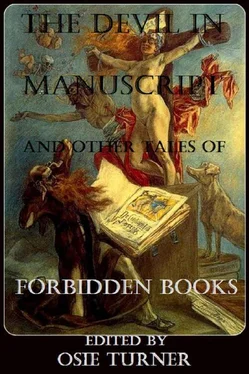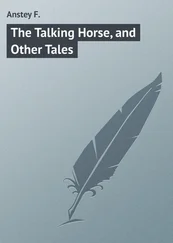“That’s a matter of opinion,” I muttered, overcoming my admiration with a mighty effort. “Personally, I’ve always liked Brent’s style.”
“Own up when you’re beaten, Charley,” Paul cried. “There’s no comparison. I’m a dub about most highbrow matters, but even I realize that Martin has improved it.”
“That’s a matter of opinion,” I repeated stubbornly.
Martin raised his eyebrows and regarded me quizzically. “You don’t appear to have much literary taste,” said he. “However, that won’t bold you back as a painter. Paul tells me that you intend studying under Verone. Perhaps we can hire a studio together.” He rose to his feet. “I’ve a painting in my bedroom which might interest you.”
“Yes, indeed, I would like to see it.”
Martin strode into an adjoining room and returned almost immediately with a canvas under his arm. Placing it in a position where the light touched it effectively, he stepped back.
“There you have it,” said he.
I uttered an exclamation of surprise at what I saw. To my as yet untrained eye, it seemed a truly remarkable piece of work. And it affected me strangely. Although it was very warm in the room, I felt a wave of intense cold pass through my frame, followed almost immediately by a sensation of acute nausea.
The painting which affected me thus was startling in its conception. It depicted a young girl lying dead on a country road blocked with snow. Desolate and forsaken, she lay there, her white face upturned to the leaden sky. Blood was streaming from her neck and slowly sinking into the snow. And all about her the tiny flakes were still falling—a thick veil of them which shut in this tragedy completely from the outer world. Somewhere in the swirling background, a dark shape lurked—an evil, twisted shape, vague and unreal as a distant dream. Was it the assassin, or was. it merely the shadow of approaching night? As I watched, it seemed to stir slightly.
“Why, this is the work of a great artist!” I cried in amazement. “Did you paint it?”
“Yes,” he answered slowly. “But it won’t do. It’s very crude.”
“Crude! Why, it fairly stands out of the canvas, I think it’s a masterpiece; You’re too modest.”
“That’s what I say,” Paul chimed in. “He’s entirely too modest.”
“I’m nothing of the sort,” Martin said contemptuously. “No one is actually modest and only fools pretend to be.”
“But where did you get the idea?” I asked. “It’s a remarkable conception.”
“The girl was a friend of mine. One afternoon I found her lying dead in the road with her throat sliced from ear to ear. Of course, I was thoroughly shocked; but I realized perfectly what an excellent model she made. I couldn’t resist making a sketch of her just as she was.”
“Who murdered her?” I asked.
“No one knows.”
“And you mean to say, Burgess, that you made a sketch of her while she lay Weeding there 1” Paul cried. “Don’t tell me that you’re such a hard-hearted brute as all that! I don’t believe a word of it.”
Martin regarded him for a moment with a kind of cold curiosity in his grey eyes. “I see that you read me like an open book, Paul,” he murmured.
“Not at all. But no one could sit down calmly beside a murdered friend and make a sketch of her. The thing is impossible.”
“Perhaps. But that is exactly how she looked when I found her.”
“What was the motive for the crime?” I asked.
“Apparently no motive,” Martin answered with a shrug of his shoulders. “Or, at least, none that could be discovered. But let’s say no more about it. It’s a nasty story and brings back unpleasant recollections.”
Soon the talk drifted into other channels. Martin gave us a glimpse into his childhood which must have been far from a happy one. At an early age he had” lost both parents and had been adopted by an eccentric aunt who had taken him to live with her in a lonely house far out in the country. This aunt had had many peculiarities. A firm believer in spiritualism, considering herself a medium, she- had often taken her small nephew into a dark room at the top of the house where she carried on ghostly conversations with the dead.
“I was only six years old at the time,” Martin finished, “and you can readily understand what effect such treatment had on my forming mind.”
“What became of her?” I asked.
“She died at last and went to join her spirit friends. But long before that I knew the whole thing to be a farce. She left me ten thousand a year which is some recompense for all she made me suffer.”
At that time ten thousand a year seemed to me a princely income. I would willingly have put up with a dozen eccentric aunts to have secured it. Something of this must have been written on my face, for Martin’s lips once more curled up at the corners into a grimace which was half smile and half sneer.
“Yes, ten thousand a year,” he repeated slowly. “Much more than I spend, for I believe that an artist should live without the luxuries of life. I tell you all this, of course, because I would like to have you with me in Paris and I don’t think you would readily room with a pauper.”
“After seeing your work, I would room with you if you hadn’t a cent,” I said warmly. “The thing is settled as far as I am concerned.”
During the remainder of the college year Paul saw Burgess Martin daily. A close friendship sprang up between the two which was to me, at least, unaccountable. They were such direct opposites that such an alliance seemed altogether beyond the bounds of reason. Perhaps, after all, real warmth is obtained only by rubbing together two quite dissimilar substances.
Paul had been going downhill steadily ever since entering college the previous fall. He was one of those unfortunate men over whom alcohol in any form has a deadly influence. High spirited, generous to a fault, full of the joy of life, my younger brother was a delightful companion and one of the most popular freshmen in the university. But let him have a few drinks and soon a startling transformation would take place. He would become morose, intolerant, prone to fly into a rage at the slightest provocation. Then would follow a period of deep depression which bordered on melancholia—a dangerous mental state when I have known him to contemplate suicide.
But Martin, in some miraculous fashion, succeeded in curing him. Paul no longer returned at night the worse for liquor. He gave up cafe life altogether and took up reading seriously. I often saw him in the college library browsing over some book which Martin had recommended. In those last few weeks of the spring term, he succeeded in passing his examinations.
The following autumn found Martin and me snugly ensconced in a comfortable apartment in Paris. My father provided me with an ample income to pursue my artistic studies and I was not slow in spending it and making acquaintances in the Latin quarter.
Those were happy days. Our studio soon became the meeting-place of congenial spirits. Martin struck the one jarring note in an otherwise perfect harmony. Among those gay chattering magpies of art, he seemed as somber and solitary as a crow. He avoided my guests as much as possible; behind his back, they called him “Monsieur la Nuit.” He had an especial detestation of women, alluding to them very much as a man might speak of some deadly and prevalent disease. When he heard the swish of their skirts on our landing, he would lock himself in his bedroom and not come out again until they had gone “A true artist can have but one mistress—his art,” he was wont to say. “The rest are leeches.”
Although I failed to share my roommate’s views, I never allowed friends to interfere with my work. I improved rapidly. Often our instructor, the famous Verone, stood before my easel longer than was his wont with the other students. Martin’s drawings alone overshadowed mine; yet I felt vaguely that they were disappointing to the master.
Читать дальше












